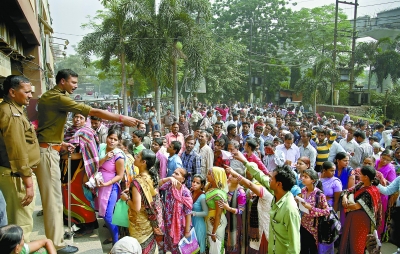Against that, the black-money crackdown will probably dent (or worse) already-fragile property prices, especially in big cities—and so the value of the collateral the banks lend against.
相反地,对黑钱的取缔将可能会降低岌岌可危的房价,特别是在大城市,以及削弱银行借贷抵押品的价值。
Most economists expect the dislocation to dampen growth in the short-term.
大多数经济学家预计这种混乱会在短期内抑制经济增长。
Households will probably put off big-ticket purchases such as motorbikes or white goods.
家家户户将可能会推迟购买高价品,例如摩托车或者大型家用电器。

Jewellers, doctors and others in professions where cash still rules will also be hard hit.
对于珠宝商、医生以及其他与现金息息相关行业的影响也许会尤为严重。
Political parties hoarding cash for election-time handouts to voters will have to tidy up their finances.
为了在竞选时期吸引投票者而囤积现金的政党将不得不理清他们的财政。
Even e-commerce sites like Amazon will be affected: over two-thirds of their sales are settled by the buyers in cash on delivery.
即使是像亚马逊的电商网站也将会受到影响:他们超过三分之二的商品销售都是买家用货到付款。
A new, shady line of work is already emerging: opportunists are said to be snapping up 1,000-rupee notes at a deep discount from those with too much stashed cash to declare.
一种全新的、名声不好的行业已经浮出水面:据说机会主义者从那些藏匿巨额现金待出手的人手中用巨大的折扣抢购1000卢比。
They will profit handsomely if they can find smaller savers willing to swap the old notes for new ones on their behalf, for a fee.
如果人们能够找到为了自己利益愿意用旧纸币交换新纸币的较小型储户,他们将获取丰厚的奖金。
The government has indicated it is gunning for those with suitcases full of rupees rather than merely a few stapled or elastic-banded wads.
政府已经表示他们针对的是那些拥有成箱卢比的人,而不是仅仅只有几捆用松紧带绑起来的钞票。
Some aspects of the plan are difficult to fathom.
这个计划的一些方面是难以揣测的。
Prominent economists, such as Kenneth Rogoff of Harvard University, are keen to scrap big-denomination notes altogether.
一些著名经济学家,如哈佛大学的Kenneth Rogoff,都倾向于去完全废除大额钞票。
But India will merely replace them.
但是,印度将仅仅只是去进行更替。
Worse, it will add a 2,000-rupee series—introducing a note that will have few conceivable uses other than mattress-stuffing, smuggling or gambling (getting change for even a 500-rupee note is already close to impossible) .
更糟糕的是,他们将增加面额2000卢比的钞票,除了塞在床垫下面,进行走私和赌博使用之外,很难想象这些钞票会用在什么地方(因为即使是将500卢比的钞票兑换零钱已经几乎不可能)
The timing is also odd.
这个时机也是很奇怪的。
India has recently introduced a system that makes it easy for anybody to make or receive payments from their mobile phone, whether they be businesses or individuals.
印度最近已经推行了一种能够让人们通过自己手机进行付款和收款更为便捷的系统,可以用于商业用途或者是个人目的。
But the Unified Payments Interface, as it is known, is still in the early stages of implementation, so cannot really help overcome the current cash-crunch.
但是,众所周知的统一支付界面(UPI)仍然在推行的初期阶段,所以不可能真的帮助克服目前的现金危机。
Mr Modi also took the cash out of circulation just as polls opened in America, eventually roiling markets.
同时莫迪先生让现金退出流通,恰逢在美国开展的民意调查,最终席卷了市场。
Cancelling banknotes is usually the work of desperate or misguided regimes. This looks different.
废除纸钞一般是穷途末路或者错误领导政权的产物,这次看上去略显不同。
Indeed, the assault on black money is justified and overdue.
的确,这次对黑钱的打击是合情合理却稍稍显得有些晚了。
But governments change the rules on the world’s simplest financial instrument—the humble banknote—at their peril.
但是,政府却冒着风险而改变了世界最简单金融工具的规则,即普通的纸钞。
Gold is already favoured by those who want to keep their savings beyond the reach of government and taxman.
那些想要让他们的积蓄摆脱政府和收税员控制的人大力推崇黄金。
Gold bugs may feel vindicated; others will have taken note.
黄金投资者可能会认为自己是正确的,而其他人会赶紧兑换完钞票。













